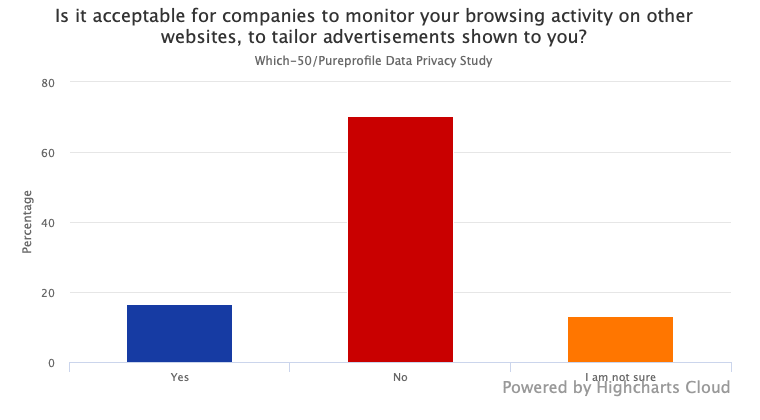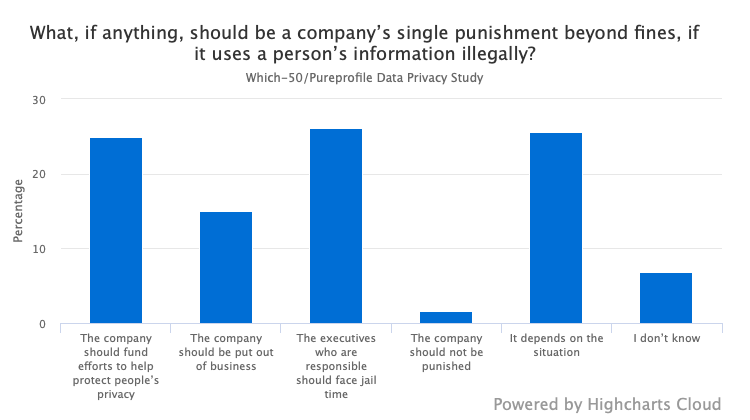Originally published on Which-50
Consumers repudiate and recoil from a central organising principle of modern marketing: that brands can — and do — target advertising and other messages at them based on their web browsing behaviour and other personal data.
Participants in the global digital marketing ecosystem have convinced themselves that consumers are thoroughly on board with the industry’s huge global, commercial data surveillance infrastructure. Yet the evidence suggests the contrary: that internet users are actually appalled once they understand how their data is used.
That is a key insight from a study conducted exclusively for Which-50 by Pureprofile. The results demonstrate how little consumers understand that their every move online is being logged, tracked, repackaged into data products, and quite literally sold to the highest bidder every moment they spend online.
The research was conducted last week and is based on a survey of 1000 consumers. It reveals an extraordinary level of antipathy towards the kind of data matching required to deliver personalised messaging and advertising that is common to almost all digital campaigns on a daily basis.
The results suggest that brands — and the marketing technology industry that supports them — have lost touch with the reality of consumer sentiment on the issue.
Don’t Drink The Kool-Aid
That is a dangerous place to be, and one that can provoke a fierce backlash and brand damage when things go awry — as they did for Facebook last year during the Cambridge Analytica scandal.
The only exception in our study to all this hostility came when there was a clear price benefit to the consumer. Seventy per cent said they wanted web sites they visit to show them discounts on products and services tailored to their interests.
The Which-50/ Pureprofile Data Privacy study also echoes a study of US consumers by the New York Times which was published recently.
We asked Scott Brinker, Editor at chiefmartec.com, VP Platform Ecosystem at HubSpot, and the driving force behind the famous marketing tech Lumascapes, what he took away from the two studies.
Brinker told Which-50, “My ‘hot takes’ reaction: I tend to agree with the consumers.
“Data is certainly helpful in modern marketing, particularly from the perspective of analytics to measure performance across a broader spectrum of customer experience touchpoints. But I think the use of data for personalisation is overrated in most scenarios.
“Most of the time, I don’t think consumers are saying, ‘wow, if only this experience was personalised, it would be awesome’. More often, they’re saying things like, ‘why is this web site so confusing to figure out? Why do I have to wait 45 minutes for a representative on a chatbot queue? Why can’t I get what I need in an online self-service manner?’”
According to Brinker there are still plenty of opportunities to improve digital customer experience, and martech products and data can be a big part of that transformation process. “But respecting data privacy shouldn’t be a barrier in that mission. In fact, hopefully more data privacy legislation will force marketers to pay more attention to the quality of the experience instead of superficial personalisation.”
Two years ago MIT and Capgemini investigated in a study which lead to a report called “From UX to CX: Rethinking the Digital User Experience as a Collaborative Exchange”.
We asked one of the authors of that study, Didier Bonnet, Capgemini’s London-based Senior Vice President and Global Practice Lead for Digital Transformation, to describe the results of our study in the context of his own work.
He told Which-50, “The survey data clearly shows the current discomfort between consumers and brands when it comes to the use of personal and behavioural data. This is not surprising to me. The Cambridge Analytica episode and the recent personal data regulation introduced in Europe, for example, have increased the awareness of consumers that firms are doing things in the background with their personal data.”
Bonnet says that martech analytics technologies are today very sophisticated and, to some extent, ahead of the ability of most consumers to grasp the way their data is used and manipulated.
This creates dissonance, he argues, and that dissonance increases when data is indirectly collected by brands and Martech firms.
“For example, I don’t want to give you my age, but it can be scraped from another online profile without my consent. This is clear in your data.”
To The Numbers
A majority (52 per cent) of consumers we surveyed said it is unacceptable for companies to monitor their behaviour on the brand’s own web site in order to tailor advertisements shown to the consumer on that same web site.
The figures get even worse when consumers were asked about the very common practice of tracking their browsing activity on other sites and then using the data to target them. 70 per cent said this was unacceptable.
Nearly three quarters (73 per cent) of those we asked also rejected the use of data from offline sources such as shopping or magazine data to target them with advertising.
When the advertising contained political content almost 80 per cent rejected targeting based on their interests.
To understand the extraordinary level of consumer sensitivity on this issue, consider the response when asked “What, if anything, should be a company’s single punishment beyond fines if it uses a person’s information illegally?”
Fully one quarter said executives at companies that did this should be imprisoned. And 15 per cent said the company should be put out of business.
According to Pureprofile Chief Scientist Uwana Evers, who designed the survey, “The majority of consumers do not think that it is acceptable for companies to collect information on their online browsing activity in order to deliver targeted advertisements. Companies and brands should take note! This sentiment will continue to get stronger if privacy concerns continue to increase and consumers perceive that they do not have a choice about how their personal data is being used online.”
Evers said it was also clear that a large proportion of consumers would prefer no advertisements at all. That is, if they had the choice. “Consumers most preferred targeted advertisements for discounted products and services of interest (70 per cent). Otherwise, the rates drastically dropped for targeted ads on products and services (51 per cent), news (46 per cent), or political messaging (22 per cent).”
She told Which-50, “Only a quarter of Australians stated that it was acceptable for companies to collect information on their online browsing activity in order to deliver targeted advertisements. This reduced to only 17 per cent when asked about the acceptability of companies capturing data from consumer activity on other sites, or from consumer offline activities.”
Furthermore, more than one in ten people were unsure about the acceptability of allowing companies to monitor their browsing behaviours for the purpose of targeted advertising. “This shows that some people know very little about the way that their data is captured and used; some consumers perhaps have not thought too much about it, and do not yet have an opinion about the collection and use of their browsing activity.”
Asked about the finding that a quarter of consumers would want executives to be jailed if they misuse consumer data, she said, “[The] data does actually surprise me! I did not expect that a quarter of the sample would advocate for such a harsh penalty. This tells us that consumers take data misuse very seriously.”
She suggested that the majority of consumers may not truly appreciate the extent to which their data is being collected and used for targeted advertising. “However, while they want to feel that their personal data is secure and that they are aware and informed when their behaviour is being monitored, they still want to access online content on demand, for free.”
Love Our Ads Or We Kill The Puppies
Gary Nissim, Managing Director of Indago Digital, a specialist search agency, said “The average consumer believes that we’re trading their personal information like Panini soccer or top trump cards.
“This is far from the case. At Indago we invest a lot of our clients’ marketing budget with Google, where we use their third-party data. That data is normalised we can’t access it and we target a set of consumers (not an individual) based on Google’s perceived interests and current needs.”
He said without effective and targeted advertising much of the internet would cease to be commercially viable and consumers would have to pay to access certain web sites. “That is why an increasing number of sites don’t allow access if you have an ad blocker on your browser.”
Some marketing leaders, however, believe marketing technology vendors – and the brands themselves – could do a better job explaining to consumers how data is used.
Cat Prestipino is the CMO of Employment Hero, an Australian HR software business that offers a unified payroll and employee benefits platform to its clients. She is also a former APAC marketing leader for digital advertising retargeting business AdRoll.
She told Which-50, “The adtech/martech sector has done an incredibly poor job at educating people on what data they’re actually collecting and what they are using it for. If consumers don’t understand how their data is being used or can’t control how their data is being used, then naturally they want to stop their data being used. The worst thing a brand can do is surprise consumers with how they’re using data.”
However, she also noted an important point in the debate. “We know that personalised ads work. We know that when brands use data to give you a seamless customer experience consumers rave about it.”
According to Prestipino, “What is also interesting is that there was a study from the US that found people were OK with relevant advertising but not with targeted advertising despite these being the exact same thing.”
Prestipino suggested that if the adtech and martech sector spoke in plain language about how it collected their data — and if people had the right, at any time, to quickly and easily control how that data was used — there would be less hostility towards targeted advertising.
The CEO of IAB Australia Gai Le Roy, whose organisation represents the country’s leading digital publishers said, “Trust and transparency is increasingly important to consumers — not only in media but any sectors that may have access to their data whether that be behavioural or explicit.”
She also questioned the methodology saying, “I would challenge some of the research from both Which-50 and the NYT as in my 20-years-plus career of running and reviewing surveys on consumer attitude to advertising there is always a large group of people who would prefer not to see any advertising. If the question was worded ‘would you rather have relevant or non-relevant advertising’ the responses would have been very different.”
However, she also acknowledged “As an industry — whether that be industry bodies, media organisation, brands or trade press — the sector can do a better job of educating consumers on how the ad ecosystem works, levers they have to control their data, legal rights when it comes to their own data as well as education around the value exchange with online media and services.”
Raz Chorev, the Chief Marketing Officer of Orange Sky CMOs, a professional services company, likewise suggested the question should have been framed differently to describe the benefits to the consumer.
“Currently, you’re browsing the internet for free, and consume information compiled on various web sites for free. If you had the choice, would you be willing to pay to access those sites, or would you be open to provide some details regarding your browsing behaviour, to keep using these web sites for free, but that means you’ll see some adverts which will be tailored to your preferences (as demonstrated in your browsing history), which option is more appealing to you?”
He said most people wouldn’t want to give something of theirs without seeing a direct benefit.
However, he also spoke a truth that many in the industry do not want to acknowledge: “Seeing a tailored ad isn’t a benefit to the viewer. It is only a way to maximise return for the advertiser. Therefore the consumer isn’t interested in giving away information, to give benefit to the advertiser. I think this is pretty straightforward.”
None of the industry respondents we contacted proffered an alternative view; that consumers might prefer not to be targeted at all if that meant they could be spared the always-on global data surveillance that underpins the martech ecosystem.
In many ways, the arguments by brands and suppliers simply reinforced the distance that separates them from their consumers on the issue of data use, a point discussed by Aoife Marie O’Connell, the founder of AI agency Yarnly.AI. O’Connell, who has previously had stints as a digital marketing for blue chip brands such as IAG, told Which-50, “The discrepancy between the adtech/martech/brands sector and the consumer is due to the current landscape of an industry fired up by the digital transformation revolution.”
“Brands are playing catch up, and not addressing consumers’ needs, in how they are operating.
“I feel customers are hostile due to the quality of the exchange and its model of interrupted marketing techniques.”
She suggested the quality of personalised ads do not reflect consumers’ best interests, creating a disconnected noisy experience. “I can understand why they’re hostile. From the survey results, my understanding is consumers are mostly comfortable with their data being analysed. They are willing to trade their personal information, but only if they have a choice, and in exchange for that ‘better deal’ or ‘discount code’ for a particular product or service or information of value.”Transparency Trumps Creepy, Every Time
While the findings caused some controversy in the industry, there was consistency across vendors, publishers and marketers about how brands need to behave to maintain the trust of consumers.
For instance, Emil Mathias, the Commercial Director for MediaMath, a leading adtech platform in Australia, captured the mood of many, saying “Consumers want to be respected and understood. The risk of misunderstanding consumers will lead to brand distrust.”
He cautioned brands against overlooking the value exchange and placing all focus on consumers ‘seeing’ their ads as many times as possible so as to be top of mind. Vendors have an important role to play in educating brands, he suggested. “Martech and adtech companies should have the vision to help brands instil the belief that it is now possible for consumers not only to ‘see’ but also engage with their messaging in a way that is appropriate and relevant for them.”
According to Employment Hero’s Prestipino, “Be upfront and honest about what you’re doing with data. Make sure your opt-out is clear and in plain language. And, for god’s sake, use the data to make a better experience for your customers — not just sell your product!”
For her part, Evers from Pureprofile said, “Transparency is key to building and maintaining consumer trust. Many sites now have small pop-up messages informing consumers about the use of cookies and that their browsing behaviour will be monitored by the site. Some even explain in simple terms why they do this and what the data is used for.”
Rajan Kumar, co-founder and Managing Director of martech consultancy The Lumery, also emphasised transparency, saying it is important to provide consumers with easy to understand information on how data is collected and used.
“The 30 page, font size 10 privacy policy and terms-of-use needs to get overhauled.”
He also echoed the views of Brinker, Bonnet and others, that it is important to actually use the data they collect to create better consumer experiences.
“Brands are continually guilty of asking for, and collecting, an enormous amount of customer data, yet are unable to leverage it to deliver a better experience for their consumers. What value is the consumer getting?”





